First Crnic Institute Graduate Fellowship Awarded
August 3rd, 2015 by Global Down Syndrome Foundation
Global donors ensure a pipeline of scientists researching Down syndrome — from undergrads and grad students to postdocs and senior investigators.
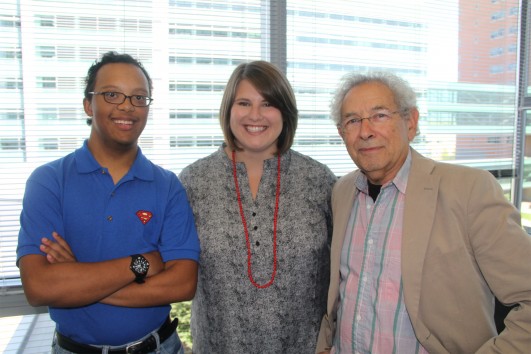 Self-advocate Alan Beals, Amber Sorenson and Dr. Tom Blumenthal
Self-advocate Alan Beals, Amber Sorenson and Dr. Tom BlumenthalDr. Tom Blumenthal, the Executive Director of the Linda Crnic Institute for Down Syndrome, believes in Down syndrome research so much he invested his personal funds to establish a graduate fellowship award. Blumenthal, along with biopharmaceutical entrepreneurs and pioneers Joe Turner and Larry Gold provided a generous challenge grant to the Crnic Institute for this purpose. In a few short months, Global has succeeded in attracting 15 donations to match theirs – mostly from scientists.
Last week, the first Blumenthal Graduate Fellowship in Down Syndrome was awarded to Amber Sorenson. The fellowship is designed to create a pipeline of excellent investigators engaged in Down syndrome research. Candidates are evaluated on the strength of their proposed science and the likelihood such science will lead to improving outcomes for people with Down syndrome.
“We are amazed by the generosity of Tom, Joe and Larry,” said Michelle Sie Whitten, President & CEO of the Global Down Syndrome Foundation. “And of course they have now challenged us again to raise about $200,000 to create a Blumenthal Graduate Fellowship housed at the Anschutz Medical Campus!”
The current fellows are appointed to the University of Colorado Boulder’s Molecular, Cellular, and Developmental Biology (MCDB) Department – the department where Blumenthal, Turner and Gold all had appointments.
Blumenthal Graduate Fellowship in Down Syndrome Recipient Amber Sorenson
Amber Sorenson, a PhD student at the University of Colorado Boulder, received the first Blumenthal Graduate Fellowship in Down Syndrome. Chosen for her scientific excellence, Sorenson will use the grant to better understand how having three copies of chromosome 21 instead of two, which causes trisomy 21, or Down syndrome, influences genes globally. The fellowship will provide Sorenson with a salary and pay her tuition for a year, as well as provide extra funding for the genetic sequencing technologies she needs to conduct her research.
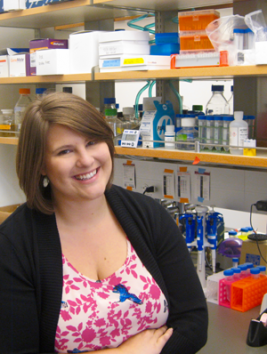
“We know the extra chromosome is tiny and has approximately 300 genes on it,” said Dr. Tom Blumenthal, Executive Director of the Linda Crnic Institute, Sie Chair in Genomics at the University of Colorado School of Medicine and a Professor at MCDB. “But now we want to know how those extra genes cause the activity of genes on all the other chromosomes to change, too. That’s what Sorenson will be studying. It’s a very exciting project.”
Sorenson works in the laboratory of Robin Dowell, Ph.D., Assistant Professor at MCDB and the BioFrontiers Institute at the University of Colorado Boulder. Dr. Dowell is a recipient of a 2013 and 2014 Crnic Institute Grand Challenge Grant. Dr. Dowell focuses primarily on how the extra copy of chromosome 21 affects cells on the molecular level, and she’s researching this by looking at how cells transcribe, or read, DNA, which may explain whether the physical and intellectual anomalies people with Down syndrome experience are caused by the extra copy of chromosome 21 or by something else.
“There are a lot of differences between any two people, whether they have Down syndrome or not, and the challenge is figuring out when an observed difference between an individual with Down syndrome and a typical individual is just normal variation,” Dr. Dowell said. “For example, I’ve got insomnia and type 2 diabetes. Is the insomnia related to the diabetes, or do I just happen to have two independent, unrelated conditions that each occur with some frequency throughout the general population?”
Sorenson will take that research to a more granular level, Dr. Dowell said. Her project will focus on understanding how the extra copy of chromosome 21 influences certain DNA binding proteins.
“These proteins control what is read out from someone’s DNA and when that happens,” Dr. Dowell said. “The extra copy of chromosome 21 creates an imbalance between the two, and Sorenson is studying that system.”
Improving the Lives of People with Down Syndrome
During her early years of college, Sorenson became interested in genetics research and, in particular, how abnormal chromosome development influences organisms at the global level. That eventually grew into an interest in Down syndrome.
“Right now, the Down syndrome research field is very heavily focused on chromosome 21 but lacks a broader look at the global changes caused by the extra chromosome,” Sorenson said. “The more we can learn about how genes are regulated and what changes result from trisomy 21, the more we’ll know about how we can reverse some symptoms and alleviate some of the problems people with Down syndrome have. Developing a better understanding of that will lay the foundation for future research.”
Making Scientific Progress
The reality is that conducting biomedical research is increasingly expensive and requires a great deal of financial resources, Dr. Blumenthal noted. The Blumenthal Graduate Fellowship is now part of the funding opportunities available for Down syndrome research including the Undergraduate Scholarships, the Crnic Institute Grand Challenge Grants, and the Sie Post-Doctoral Fellowship Program at the BioFrontiers Institute.
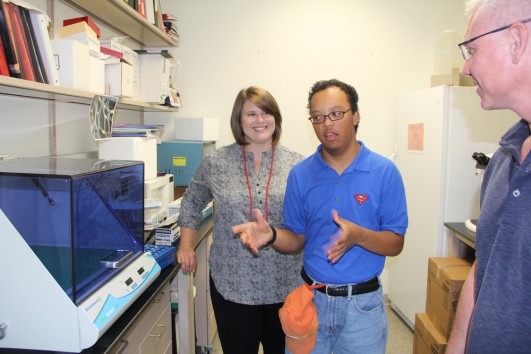
Dr. Blumenthal is excited about the future of Down syndrome research. “We’re suddenly able to track this extra chromosome, where we weren’t before,” Dr. Blumenthal said. “It’s a matter of putting good money behind good science.”
About the Linda Crnic Institute for Down Syndrome
The Linda Crnic Institute for Down Syndrome is the first medical and research institute with the mission to provide the best clinical care to people with Down syndrome, and to eradicate the medical and cognitive ill effects associated with the condition. Established in 2008, the Crnic Institute is a partnership between the University of Colorado School of Medicine, the University of Colorado Boulder, and Children’s Hospital Colorado. Headquartered on the Anschutz Medical Campus in Aurora, the Crnic Institute includes the Anna and John J. Sie Center for Down Syndrome at Children’s Hospital Colorado. It partners both locally and globally to provide life-changing research and medical care for individuals with Down syndrome. The Crnic Institute is made possible by the generous support of the Anna and John J. Sie Foundation, and relies on the Global Down Syndrome Foundation for fundraising, education, awareness and government advocacy. It is a research and medical-based organization without political or religious affiliation or intention.
To help fund the important Down syndrome research being done at the Crnic Institute and the University of Colorado Boulder please visit our donation page.
First Lady Celebrates Global Self-Advocates in DC
August 3rd, 2015 by Global Down Syndrome Foundation
College-bound Devon Adelman and Megan Bomgaars represent Global at First Lady Michelle Obama’s 2015 “Beating the Odds” summit at the White House. The event is part of the First Lady’s Reach Higher Campaign, which celebrates students who have overcome the “odds” to attend college.
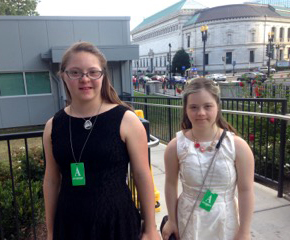
Devon Adelman and Megan Bomgaars in DC
When the Global Down Syndrome Foundation was invited to participate in the First Lady’s “Beating the Odds” summit, it didn’t have to look far to find two inspirational young women to represent the Foundation. Devon Adelman and Megan Bomgaars, two of only 150 students selected nationwide to attend the event, have Down syndrome and managed to “beat the odds” by attending college to pursue their career goals and to show the world people who are differently-abled can obtain a post-secondary education.
“The Global Down Syndrome Foundation was honored to be a part of the First Lady’s ‘Beating the Odds’ summit. Megan and Devon are two extraordinary young women who exemplify the unlimited possibilities for individuals with Down syndrome,” said Michelle Sie Whitten, GLOBAL’s President & CEO. “Their personal success, self-advocacy work, and desire to further their education shows how people with Down syndrome are ‘reaching higher’ to lead their very best lives.”
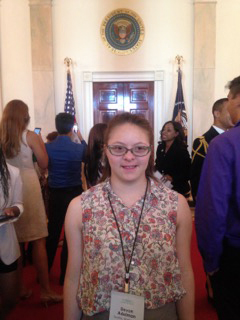
Devon Adelman at the White House
Devon Adelman, an 18-year-old from Seattle, has Down syndrome, but that hasn’t prevented her from setting high goals and achieving them. While in high school, Adelman gave a keynote speech at the United Nations in New York City, worked with the Special Olympics and volunteered at the Seattle Aquarium. This fall she’ll be studying marine biology at Highline College in Des Moines, Washington.
“My favorite part was going in the White House, seeing Michelle Obama and then the unexpected visit from President Obama! It was amazing and beautiful,” said Devon. “My second favorite was talking with the cute boys in the entry hall…”
“I have to admit, I never expected to be invited to the White House in my life. So to go with Devon and represent the Global Down Syndrome Foundation was truly outstanding. I hope this event can serve as a wake up call to the disability community – to have high expectations, and to the education institutions – to include this amazing group of individuals,” stated Devon’s mom, Sue Adelman.
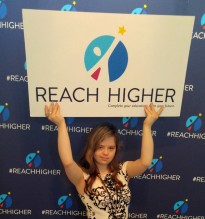
Megan Bomgaars at the White House
Megan Bomgaars, a 22-year-old from Evergreen, Colorado, lives by the motto “Don’t Limit Me!” In 2013 her video telling peers and educators “Don’t Limit Me!” became a YouTube hit with over 300,000 views. Bomgaars has started her own business, Megology, selling her own line of handmade products to help pay her college tuition. Bomgaars was the keynote speaker at this year’s National Down Syndrome Congress Annual Convention in Arizona. This fall she’ll study film at the University of Colorado.
“I was surprised and shocked to be in the White House in person for the Beating the Odds summit. It was cool to sit in the front row and see Mrs. Obama and Terence Jenkins from E! TV News,” said Megan. “I felt happy to represent people with Down syndrome who beat the odds.”
Kris Bomgaars, Megan’s mom shared, “I felt a sense of overwhelming pride that my daughter was representing people with Down syndrome and that the event encourages post-secondary education. Everyone at the White House graciously received Megan and Devon. I hope it’s the first of many events that will include people with differently-abled.”

E! News co-anchor Terrence Jenkins, First Lady Michelle Obama,
and Manuel Contreras, a rising senior at Brown University
The Reach Higher Campaign is the First Lady’s effort to inspire every student in America to take charge of their future by completing their education past high school, whether at a professional training program, a community college, or a four-year college or university. Students who attended the Beating the Odds summit were introduced to some basic tools necessary for success while pursuing their secondary education and/or professional training. They also had the opportunity to network among their peers with diverse backgrounds. The event was held on Thursday, July 23, 2015, at the White House.
Better access to education and medical care are important as the lifespan of individuals with Down syndrome increases and more emphasis is put on inclusion in the workplace and society. To address the needs of adults with Down syndrome Global has formed the Global Down Syndrome Foundation Adults with Down Syndrome Task Force. The Global Task Force is composed of over 60 dedicated experts, self-advocates and family members from around the world. The members are assisting to establish a world-class interdisciplinary medical care center for adults with Down syndrome.
Global to Honor Actress and Model Jamie Brewer
August 3rd, 2015 by Global Down Syndrome Foundation
 Jamie Brewer as Nan, Season 3 of American Horror Story: Coven, courtesy of FX
Jamie Brewer as Nan, Season 3 of American Horror Story: Coven, courtesy of FX
 Jamie Brewer as Marjorie, Season 4 of American Horror Story: Freak Show, courtesy of FX
Jamie Brewer as Marjorie, Season 4 of American Horror Story: Freak Show, courtesy of FX
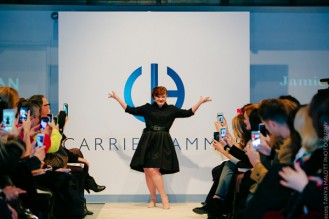 Brewer wearing Carrie Hammer at the “Role Models Not Runway Models” NYFW event
Brewer wearing Carrie Hammer at the “Role Models Not Runway Models” NYFW event
Jamie Brewer, the “American Horror Story” star, will receive the 2015 Quincy Jones Exceptional Advocacy Award at Global’s Be Beautiful Be Yourself Fashion Show on October 24.
The Global Down Syndrome Foundation established the Quincy Jones Exceptional Advocacy Award in honor of Quincy’s life-changing leadership in humanitarian efforts to help the disadvantaged. The award recognizes those who have championed people who are differently-abled, including people with Down syndrome, in several categories such as humanitarian work, self-advocacy, and public service.
Brewer joins notable recipients including Quincy Jones, Jamie Foxx, John C. McGinley, Timothy P. Shriver, Kyra Phillips, Patrick Kennedy, Beverly Johnson, and self-advocates Karen Gaffney, DeOndra Dixon, Tim Harris, Sujeet Desai, Brad Hennefer and Luke Zimmerman.
“What an exciting honor to receive the Quincy Jones Exceptional Advocacy Award from the Global Down Syndrome Foundation,” said Brewer. “Being an advocate has been a big part of my life. I love meeting and being inspired by everyone. Advocacy encourages awareness for everyone, and it’s a good thing. I believe advocacy in our world helps us create a better place we all call home.”
Brewer grew up loving all forms of the arts, especially movies and theatre productions. She was fully included in Texas and Southern California public school systems from kindergarten through high school. After graduation, she attended a local California college and studied theatre arts. Through the casting liaison service Down Syndrome in Arts & Media she landed a role on the award-winning TV series “American Horror Story”.
Brewer made headlines earlier this year when she rocked the runway at New York Fashion Week as the first model with Down syndrome to walk.
“It’s amazing that the fashion industry is including individuals” who are differently-abled, Brewer told ET.
Brewer plans to continue to be an advocate and role model for people who are differently-abled.
In addition to receiving the Quincy Jones Exceptional Advocacy Award at Global’s Be Beautiful Be Yourself Fashion Show, Brewer will walk the runway along with about 20 other beautiful models with Down syndrome and celebrity escorts. The Be Beautiful Be Yourself Fashion Show is Global’s marquee fundraiser and attracts a sold-out crowd of 1,200 people every year. This year’s event is Saturday, October 24, 2015 at the Colorado Convention Center.
Cheer on Brewer and the other models with Down syndrome by securing your tickets or table sponsorships today at BeBeautifulBeYourself.org.
Alzheimer’s-DS Seminal Conference in Arizona
August 3rd, 2015 by Global Down Syndrome Foundation
A packed house heard from leading scientists and clinicians at Global’s Research and Medical Care Roundtable: “Alzheimer’s Disease and Down Syndrome – What Parents and Caregivers Should Know.”
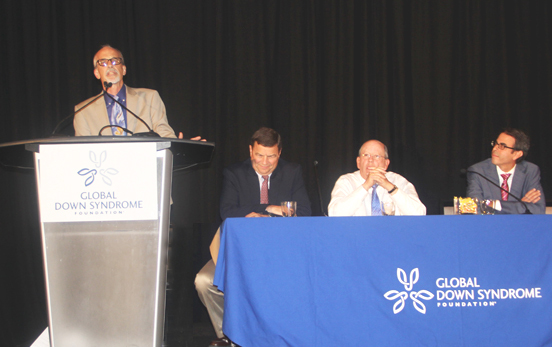
DS & AD Experts Drs. Dennis McGuire, Brian Chicoine, Ira Lott and Michael Rafii
Global’s Roundtable attracted world-renowned Down syndrome and Alzheimer’s disease experts to the NDSC Annual Convention in Phoenix, Arizona, on June 25. The half-day of topics on cutting-edge research and best-practices medical care included current research projects, promising trials, symptoms and signs of Alzheimer’s disease in Down syndrome, diagnosis of dementia, and behavioral issues in people with Down syndrome and dementia. Global is dedicated to supporting the exploration into the important relationship between Alzheimer’s and Down syndrome.
The experts presented their work and answered questions for 285 attendees – 85 percent self-advocates and family members, and 15 percent professionals. Thirty-two international attendees represented countries including Argentina, Brazil, Canada, Chile, Dominican Republic, Guatemala, México, Nigeria, Peru, Puerto Rico, Spain, and the United Kingdom.
“What an excellent offering for this conference! It reminds me of the profound impact the Global Down Syndrome Foundation is having,” said Karen Prewitt, Florida parent of a child with Down syndrome and Board Member of Down Syndrome Association of Jacksonville.
The Global Roundtable was broken into two panels: Clinical Care and Research. The Clinical Care Panel included moderator Dr. Brian Chicoine, presenters Dr. Ira Lott, Dr. Dennis McGuire, and Dr. Michael Rafii. The Research Panel included moderators Dr. Joaquin Espinosa and Dr. Tom Blumenthal, presenters Dr. Elliott Mufson, Dr. Huntington Potter and Dr. Donna Wilcock.
Dr. Lott’s research interest is focused on development and aging in Down syndrome. His Roundtable presentation examined the connection between seizures and dementia in individuals with Down syndrome. You can view his presentation powerpoint on the Global website.
In addition to his extensive research work, Lott is a member of Global’s Adults with Down Syndrome Task Force, a nearly 70 member committee made up of renowned medical professionals, activists, and self-advocates from around the world to help establish an Adult Down Syndrome Medical Center. This new Center will complement Global’s existing affiliates — the Crnic Institute and the Sie Center for Down Syndrome — in providing a spectrum of research and medical care to the Down syndrome community.
Lott has received two national awards for his research and has been commended by the California State Senate for his work on behalf of individuals who are differently-abled. Lott’s research has been supported by the National Institutes of Health, Alzheimer’s Association, and the State of California.
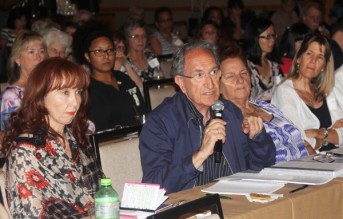
The Roundtable’s large audience reflected the keen interest the Down syndrome community has for Down syndrome and Alzheimer’s disease research. The scientific world now understands that 100 percent of people with Down syndrome have the “brain pathology” of Alzheimer’s disease. However, it is estimated that only 50 percent will get the actual symptoms of dementia associated with the disease. Clearly, answering the question why half of the people with Down syndrome, do NOT get dementia is a promising path towards treatments or a cure.
Global Supports 21st Century Cures Act
August 3rd, 2015 by Global Down Syndrome Foundation
The House overwhelmingly passes the bipartisan legislation, which would increase NIH funding and potentially create a new era for Down syndrome research.
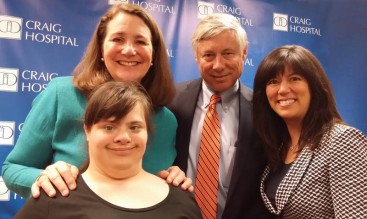 Congresswoman Diana DeGette and Congressman Fred Upton with Global intern Kat Loewen and Global President & CEO Michelle Sie Whitten
Congresswoman Diana DeGette and Congressman Fred Upton with Global intern Kat Loewen and Global President & CEO Michelle Sie WhittenCongresswoman Diana DeGette and Energy and Commerce Committee Chairman Fred Upton have been working on a new initiative that aims to accelerate the pace of cures and medical breakthroughs in the United States. Health research and innovation move at a rapid pace, and it is important to ensure the federal agencies involved in research and drug and device development have the necessary tools to keep up.
“We have dedicated scientists and bold leaders at agencies like the NIH (National Institutes of Health) and the FDA (U.S. Food and Drug Administration), but when our laws don’t keep pace with innovation, we all lose,” as stated in the mission of the 21st Century Cures Act.
Under the 21st Century Cures Act, the NIH would receive at least an additional $1.75 billion per year for five consecutive years and the FDA will receive an additional $550 million per year during that term. These resources will support important new research and the safe and speedy approval of new treatments and therapies.
Global supports the legislation because it has the potential to dramatically increase the number of labs and the types of research into Down syndrome currently being funded by the NIH. Reps. DeGette and Upton met with Global executives Michelle Sie Whitten and David Charmatz, and Global intern Kat Loewen, along with leaders of over a dozen health care nonprofits in the Denver area on June 29 to discuss the 21st Century Cures Act.
“What a net positive for everyone – here is a way to increase funding without taking away from something else,” said Whitten, President and CEO of Global. “The Down syndrome community should get behind this in Congress in a big way and we’re here to help make that happen.”
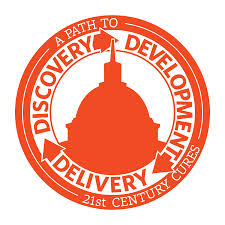 About the 21st Century Cures Act
About the 21st Century Cures Act
DeGette and Upton took a comprehensive look at what steps could be taken to accelerate the pace of treatments and cures in the U.S. This bipartisan effort, launched more than one year ago, took a broad look at the full arc of the process – from spurring the latest discoveries in basic science, supporting the development of new, innovative drugs and devices, to ensuring the effective and efficient delivery of care to patients. The 21st Century Cures Act – introduced as H.R. 6 – passed the Energy and Commerce Committee unanimously on May 21, 2015, and passed the full House 344-77 on July 10.
The bill’s authors, DeGette, Upton, and Congressmen Joe Pitts, Frank Pallone Jr. and Gene Green, said: “Today, we took a big leap on the path to cures, but we still have much work left to do. The 344 votes today should be a springboard for action. On to the Senate.”
H.R. 6 would streamline various regulations and requirements to make sure researchers are able to comply with them, and it would eliminate duplication in the review process by fostering broader utilization of central institutional review boards (IRBs) for trials being conducted at multiple institutions.
The impact on Down syndrome research
Because Down syndrome remains one of the least-funded genetic conditions by the NIH, the potential for a new infusion of research funding promises to greatly expand upon the exciting work already being done on Down syndrome’s connection to Alzheimer’s disease, cancer, autoimmune disorders, and other ailments, diseases, and conditions. The hope is that such research will lead to treatments that benefit not only people with Down syndrome but also the typical population.
As part of the push for the passage of the 21st Century Cures Act, the Global Down Syndrome Foundation will host a Town Hall Briefing with Congresswoman DeGette on Friday, August 7th, on the Anschutz Medical Campus in Aurora, Colorado. Registration for the briefing is on a first-come, first-served basis.
Follow the progress of the 21st Century Cures Act on Twitter with hashtags #Path2Cures and #Cures2015, and contact your senator to voice your support as legislation moves through the Senate.
Global Down Syndrome Foundation capitalizes on viral photo
July 27th, 2015 by Global Down Syndrome Foundation
ADA at work: Two girls with Down syndrome honored at White House summit
July 24th, 2015 by Global Down Syndrome Foundation
Global to Honor Actress and Model Jamie Brewer
July 23rd, 2015 by Global Down Syndrome Foundation
Global to Honor Actress and Model Jamie Brewer
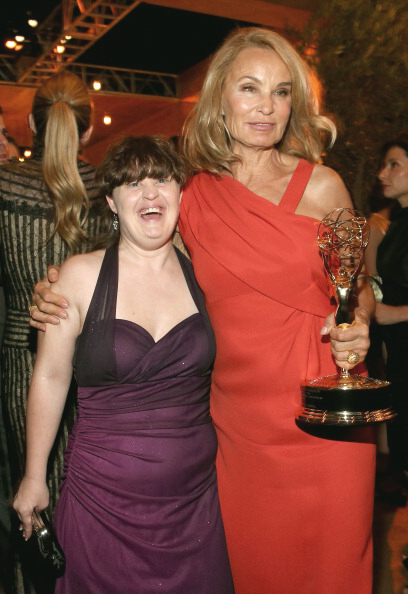 Jamie Brewer and American Horror Story costar Jessica Lange
Jamie Brewer and American Horror Story costar Jessica Lange
 Jamie Brewer as Nan, Season 3 of American Horror Story: Coven, courtesy of FX
Jamie Brewer as Nan, Season 3 of American Horror Story: Coven, courtesy of FX
 Jamie Brewer as Marjorie, Season 4 of American Horror Story: Freak Show, courtesy of FX
Jamie Brewer as Marjorie, Season 4 of American Horror Story: Freak Show, courtesy of FX
 Brewer wearing Carrie Hammer at the “Role Models Not Runway Models” NYFW event
Brewer wearing Carrie Hammer at the “Role Models Not Runway Models” NYFW event
Jamie Brewer, the “American Horror Story” star, will receive the 2015 Quincy Jones Exceptional Advocacy Award at Global’s Be Beautiful Be Yourself Fashion Show on October 24.
The Global Down Syndrome Foundation established the Quincy Jones Exceptional Advocacy Award in honor of Quincy’s life-changing leadership in humanitarian efforts to help the disadvantaged. The award recognizes those who have championed people who are differently-abled, including people with Down syndrome, in several categories such as humanitarian work, self-advocacy, and public service.
Brewer joins notable recipients including Quincy Jones, Jamie Foxx, John C. McGinley, Timothy P. Shriver, Kyra Phillips, Patrick Kennedy, Beverly Johnson, and self-advocates Karen Gaffney, DeOndra Dixon, Tim Harris, Sujeet Desai, Brad Hennefer and Luke Zimmerman.
“What an exciting honor to receive the Quincy Jones Exceptional Advocacy Award from the Global Down Syndrome Foundation,” said Brewer. “Being an advocate has been a big part of my life. I love meeting and being inspired by everyone. Advocacy encourages awareness for everyone, and it’s a good thing. I believe advocacy in our world helps us create a better place we all call home.”
Brewer grew up loving all forms of the arts, especially movies and theatre productions. She was fully included in Texas and Southern California public school systems from kindergarten through high school. After graduation, she attended a local California college and studied theatre arts. Through the casting liaison service Down Syndrome in Arts & Media she landed a role on the award-winning TV series “American Horror Story”.
Brewer made headlines earlier this year when she rocked the runway at New York Fashion Week as the first model with Down syndrome to walk.
“It’s amazing that the fashion industry is including individuals” who are differently-abled, Brewer told ET.
Brewer plans to continue to be an advocate and role model for people who are differently-abled.
In addition to receiving the Quincy Jones Exceptional Advocacy Award at Global’s Be Beautiful Be Yourself Fashion Show, Brewer will walk the runway along with about 20 other beautiful models with Down syndrome and celebrity escorts. The Be Beautiful Be Yourself Fashion Show is Global’s marquee fundraiser and attracts a sold-out crowd of 1,200 people every year. This year’s event is Saturday, October 24, 2015 at the Colorado Convention Center.
Cheer on Brewer and the other models with Down syndrome by securing your tickets or table sponsorships today at BeBeautifulBeYourself.org.
Recent Posts
- NATIONAL ORGANIZATIONS JOIN FORCES TO PUBLISH NEW COVID-19 & DOWN SYNDROME RESOURCE
- ORGANIZACIONES NACIONALES SE UNEN PARA PUBLICAR NUEVO RECURSO DE COVID-19 Y SÍNDROME DE DOWN
- GLOBAL DOWN SYNDROME FOUNDATION APPOINTS TWO NEW BOARD MEMBERS
- GLOBAL DOWN SYNDROME FOUNDATION RAISES CRUCIAL AWARENESS AT THE FIRST EVER VIRTUAL BE BEAUTIFUL BE YOURSELF FASHION SHOW
- 11.14.20CTRNASCSNETCAN
White House Honors Students Who Have ‘Beaten the Odds’
July 23rd, 2015 by Global Down Syndrome Foundation
July 2015 Newsletter
July 16th, 2015 by Global Down Syndrome Foundation
$500,000 for Alzheimer’s-Down Syndrome Research, Terrence Howard Supports Global, Educational Grants Awarded, Hollywood Ball, DS-Cancer Research, and More!

 Experience our inspirational and groundbreaking videos and photos. Our children and self-advocates are beautiful AND brilliant!
Experience our inspirational and groundbreaking videos and photos. Our children and self-advocates are beautiful AND brilliant! Make sure your local Representatives are on the Congressional Down Syndrome Task Force.
Make sure your local Representatives are on the Congressional Down Syndrome Task Force.